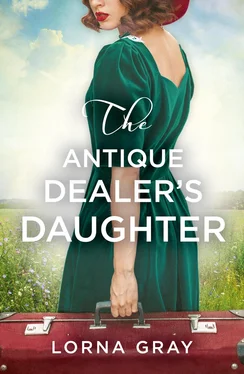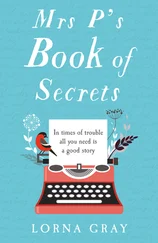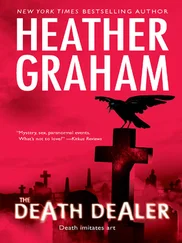I grinned. ‘You think I’m here like a forlorn child with my name on a tag about my neck, waiting for an aged relative to claim me? Not a bit of it. My father isn’t really an overbearing sort of parent, you know. It’s me that is torturing him. I gave him a fright by first telling him that I was going to leave school and aim for adulthood at the age of fourteen; and then again as soon as I reached sixteen and I took to filling the gaps left in the dance halls as well since the older women were stumbling into hasty marriages with their brave RAF men in between bombing runs. Now I’m a grown woman and confusing him all over again by giving up the job I had to argue my way into taking in the first place and, actually, this visit to see my cousin wasn’t his idea. It was my mother’s. And besides all that, it was my choice to come here too.’
If he noticed my defensiveness about the course of the decision-making, he didn’t show it. I cast him a shy glance. ‘Did your …?’ I began then flushed. ‘No, sorry, never mind. Ignore that.’
My companion prompted calmly, ‘Did my what?’ When I only shook my head mutely, he added, ‘Do you mean to ask if my father is similarly dictating my choice of career? No. The Langton name has been put to many different enterprises, good and bad, but when it came to joining the army I found – how shall I put it? – well, without going into the details, it was easy to find this was one aspect that was purely me. I had the expectation from an early age that I would follow in Father’s footsteps and by the time I was about your age I was already there.’
I remarked carefully, ‘When you were my age you must have been getting ready to fight.’
He confirmed, ‘I was in my first command at the outbreak of conflict.’
I’d been right; he did find honesty easier than I did. There was not even sadness there, nor regret for the state of war. There was assurance and a sense that the military life was a vital part of this man’s idea of self-worth.
I stirred restlessly. Suddenly a whisper of that old distress crept close again. I knew I’d asked but there had been a reference to his brother in there somewhere. And perhaps the shadow of something else that was too deep for the cautious gossip recounted by my cousin’s letters. It seemed to me that even if he didn’t find it sad, to me there was something awful about a man being brought up to believe that a hard, destructive career such as his was the counterbalance that restored his value. Unfortunately, I think the Captain noticed my flinch. I could feel his gaze on me as he observed, ‘You do try very hard for peacefulness, don’t you? You don’t want to talk about our little balding friend any more than you have to. And you really didn’t lie when you said you won’t hear the gossip about my brother …’
He had noticed that I’d shied from his reference to the weight that rested on the Langton family name. He must have noticed that I’d shied from his mention of war too. It struck me that he really did make a habit of considering all the subtleties of everything that was said. All along he’d been working to solve the puzzle of who I was and lead me into explaining the cause of my unwillingness to discuss the darker aspects of what had happened at the Manor. I suppose he was afraid it meant something more serious was afoot. So he’d given himself time to study me and this was the result. Well, he must know I was a harmless fool by now.
‘I do try for peacefulness.’ I mimicked his phrasing a shade bitterly. ‘If you must know, my decision to pay this visit came just after I made the mistake of mentioning to my parents that, amongst other things, I think I’m a pacifist. Or a conscientious objector, or something like that. At least, I would be if I were a man and required to do something about it. It’s not a particularly socially acceptable thing to confess at the moment, is it? So much so my father took it as a sign I was concealing something else. I’d abandoned the nice safe prospect of a future in his shop and left a perfectly respectable job at the chemists, and according to him, it’s not like me to do that without having the nice logical prop of marriage or retirement to make the decision for me. He became convinced that a severe emotional loss must have slipped in somewhere along the way and he just hadn’t noticed before now. And since I’d just been ranting about seeking peaceful solutions, I could hardly stand and argue the point, could I?’
I knew it sounded feeble. It made me finish on a lame note of excuse, ‘The truth is I can’t even see my mother’s cat with a mouse without wishing to intervene.’
I turned my head. He saw my defiance – I knew this would be seen as a challenge to a man who made war his business. He also saw that I was ready to be humbled. He didn’t do it. Perhaps it was the mark of a soldier that he didn’t make a stand on a point that was already won.
Instead he took that same note of practical calm as he remarked, ‘Forgive me, but haven’t you got something the wrong way round there? I had understood that the basic principle of avoiding conflict meant that you didn’t intervene. Unless your philosophy is based solely on the premise that you possess sufficiently superior strength to render all opposition futile. What would you do if the cat were the size of a tiger and you couldn’t just pick him up?’
It was a fair point. He would naturally think along the lines of irrepressible nature, both within the cat and its victim, and of solutions being dependent on superior force so that all sides might be cowed into perfect peace. And perhaps he was right and I wasn’t a true pacifist. Something certainly cut too close to a nerve that had already been set on edge by the bizarre contradiction of wishing this man would go away, changing my mind and then reverting again just as soon as he began to talk about his career, only to find myself at the same time really, really treasuring the experience of talking seriously like this.
It made me say with a better attempt at honesty than before, ‘Tell me that peace means days and nights spent hiding in holes while the danger that is raging outside switches between the fury of a foreign power trying to reduce an entire city to embers and our own people who are cheerfully picking through the smouldering rubble.’
‘You mean looters?’ My slur had startled him. His manner had suddenly grown harder to match. Perhaps he felt I’d meant the point as a personal barb. I supposed people like him tended to be kept safely anaesthetised from that particularly commendable of aspect of our resilience to the Blitz. It wouldn’t do for a soldier to realise that the people for whom he was laying down his life were utterly, entirely, ordinary and flawed, and therefore potentially undeserving of the sacrifice.
It cooled my readiness to be defensive. It curbed whatever I had intended to say next. I wasn’t trying to hurt him. I was simply trying to explain the rest. I added with a wry smile, ‘It really is quite unfortunate, don’t you think, that I’ve come here to establish a little calm, to shake the dust of a ruined city from my boots, so to speak, and within the first twenty-four hours I’ve received absolute proof that the war might end and the world might change, but absolutely nothing alters human nature.’
After a moment, the Captain observed mildly, ‘Bertie’s attack and the little invasion at the Manor really have frightened you, haven’t they?’
The sudden steadiness in the Captain’s voice after its momentary roughness made me jump. Now I realised with a peculiar little shock that his protectiveness was there again in a faint whisper, and sympathy without ridicule.
‘Actually, no,’ I told him with an odd little shiver. It had jolted my mind more than it ought to hear the attack on Mr Winstone grouped with the loss of my bag. It’s shameful to admit but I’d almost forgotten about yesterday in the effort of tiptoeing around talking about today. ‘Or, at least, the truth is I’m not really upset about them. It isn’t really about those people and what they’ve done. It’s about me and the fact that I’m desperately hoping everything will be different now – now the war is over, I mean – only I’m afraid nothing is going to be very different at all. Days like yesterday prove it. At least, I think they do.’ A hapless smile. ‘I know this feeling begins with the knowledge that war made people like you give up something profoundly personal for the sake of a mass of people you’d never even met and—’
Читать дальше












